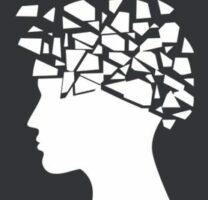From Wild Truth: “‘Crazy’ is not being in touch with reality. Being in touch with reality means seeing things clearly, without the veils or filters known as defenses. We employ defenses (e.g., denial, projection, dissociation) when reality is too painful to see. Reality is too painful to see because we have unresolved historical traumas due to the actual horror of the realities we have experienced. Our defenses make life more palatable to us, yet they’re all manifestations of our craziness. To that end, we’re all crazy to some degree, to the degree that we have defenses.
However, part of the craziness of society is to only label as ‘crazy’ a certain tip of the iceberg of the defenses. The easiest people to label ‘crazy’ are not necessarily any crazier than the rest of us, but only have defenses different from the norm, especially defenses that are difficult for the norm to understand or relate to . . .
Also, many people labeled ‘crazy’ can’t function as well in society. This doesn’t mean they’re necessarily any crazier than anyone else, and sometimes they may even be objectively less crazy, that is, better able to see reality.
. . . Essentially, if a person stocked full of psychological defenses is just able to fit in and function, others like him or her will not consider him or her crazy. This allows all sorts of objectively crazy behavior and attitudes and ways of thinking to fly under the radar of conventional consciousness.
Also, part of healing psychological wounds and the defenses holding them in place means slowly facing reality more. This can be extremely painful, and for a time, sometimes a long time, this can make it more difficult for a person to function in society. So even though a person is healing their wounds, that is, becoming healthier, they can be considered more crazy.
Also, many supposedly sane people are actually just one step away from being labeled crazy. A few shifts in defenses, a slightly lessened ability to hide their defensive patterns, or a shift to an environment where different defenses are considered acceptable can lead others to look at them as crazy.”

***
Back to Around the Web











